英文对转基因食品与有机食品的观点
是否该鼓励转基因食品英语作文
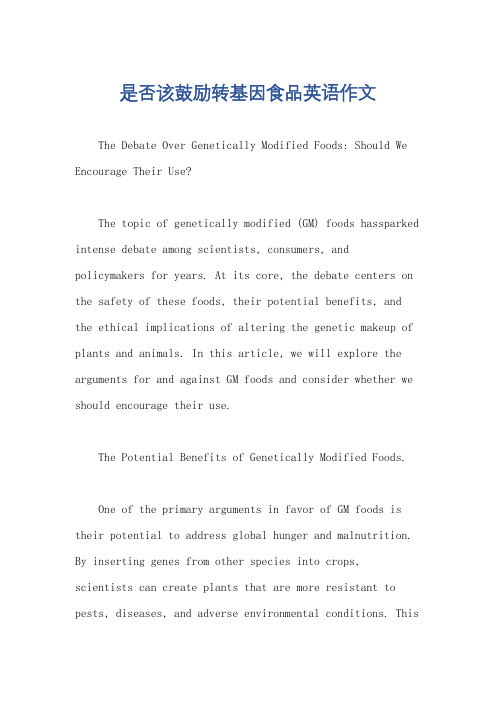
是否该鼓励转基因食品英语作文The Debate Over Genetically Modified Foods: Should We Encourage Their Use?The topic of genetically modified (GM) foods hassparked intense debate among scientists, consumers, and policymakers for years. At its core, the debate centers on the safety of these foods, their potential benefits, and the ethical implications of altering the genetic makeup of plants and animals. In this article, we will explore the arguments for and against GM foods and consider whether we should encourage their use.The Potential Benefits of Genetically Modified Foods.One of the primary arguments in favor of GM foods is their potential to address global hunger and malnutrition. By inserting genes from other species into crops,scientists can create plants that are more resistant to pests, diseases, and adverse environmental conditions. Thiscould lead to higher yields and more reliable food sources in areas where crop failure is common.Additionally, GM foods can be engineered to contain higher levels of nutrients. For example, scientists have developed GM rice that is enriched with beta-carotene, a precursor to vitamin A, which can help combat vitamin A deficiency in developing countries. Similarly, GM crops can be designed to have lower levels of harmful substances, such as toxins or allergens, making them safer for human consumption.Concerns About the Safety and Ethics of Genetically Modified Foods.Despite the potential benefits, there are significant concerns about the safety and ethics of GM foods. One major concern is the long-term ecological impact of introducing genetically modified organisms (GMOs) into the environment. GM crops could interact with wild relatives and create new, potentially invasive, species. Furthermore, the long-term effects of consuming GM foods on human health are still notfully understood.Ethical concerns also arise from the practice ofgenetic modification. Some argue that playing God byaltering the genetic code of plants and animals isunethical and goes against the natural order. Others fear that GM foods may lead to the loss of biodiversity as farmers rely increasingly on a few genetically modified varieties rather than maintaining a diversity of crop types.The Role of Regulation and Consumer Choice.In addressing these concerns, a balanced approach is needed. Strict regulatory frameworks should ensure that GM foods are safe for human consumption and environmentally responsible. This includes rigorous testing and monitoringof GM crops to assess their impact on human health, ecosystems, and biodiversity.Moreover, consumers should have the right to choose whether they want to consume GM foods or not. Labeling laws that clearly indicate whether a product contains GMOs canhelp consumers make informed decisions about their food purchases. This approach respects consumer preferences and promotes transparency in the food supply chain.Conclusion.The debate over genetically modified foods is complex and multifaceted. While GM foods have the potential to address global hunger and malnutrition, there are also concerns about their safety, environmental impact, and ethical implications. A balanced approach that combines strict regulation, consumer choice, and ongoing research is needed to ensure that GM foods are safe, sustainable, and beneficial for society.Encouraging the use of GM foods is not a simple yes or no question. Instead, it requires a nuanced understanding of the science, social implications, and consumer preferences involved. By taking a balanced and responsible approach, we can harness the potential benefits of GM foods while minimizing their risks and ensuring that they serve the best interests of society and the environment.。
有机食品与转基因食品的比较

GM food not only has low investment and high output value, but also has great contribution to solve the food problem.
Views on GM food and organic food
The comparative analysis of both GM food and organic food
LOGO
Contents
1 Definition odvantages and disadvantages
of GM food
3
Views on GM food and organic food
Definition of GM and organic food
Definition
GM foods
Organic food
GM food
• Genetically modified food refers to the genetically modified organism strain obtained by the use of GM technology, and the food processed and produced with the GM organism as direct food or raw material is called GM food.
英语考试作文-雅思大作文写作范文——转基因食物是好是坏?
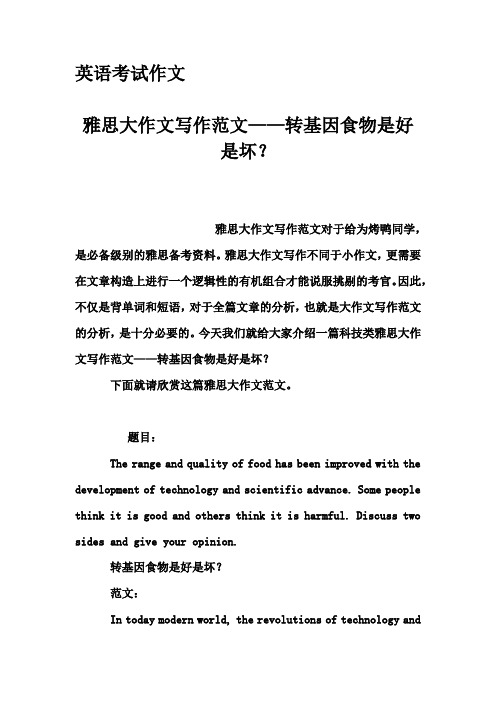
英语考试作文雅思大作文写作范文——转基因食物是好是坏?雅思大作文写作范文对于给为烤鸭同学,是必备级别的雅思备考资料。
雅思大作文写作不同于小作文,更需要在文章构造上进行一个逻辑性的有机组合才能说服挑剔的考官。
因此,不仅是背单词和短语,对于全篇文章的分析,也就是大作文写作范文的分析,是十分必要的。
今天我们就给大家介绍一篇科技类雅思大作文写作范文——转基因食物是好是坏?下面就请欣赏这篇雅思大作文范文。
题目:The range and quality of food has been improved with the development of technology and scientific advance. Some people think it is good and others think it is harmful. Discuss two sides and give your opinion.转基因食物是好是坏?范文:In today modern world, the revolutions of technology andscience have an impact on many aspects of life including the standard and different kinds of food we consume. However, there is some controversy about the effect of those changes. While it is possible to claim that these effects are improvement, my view is that the disadvantages outweigh the advantages.在当今的现代世界,技术和科学的革命影响了生活的许多方面,包括我们消费的标准和不同种类的食物。
关于转基因食品的英语作文150字
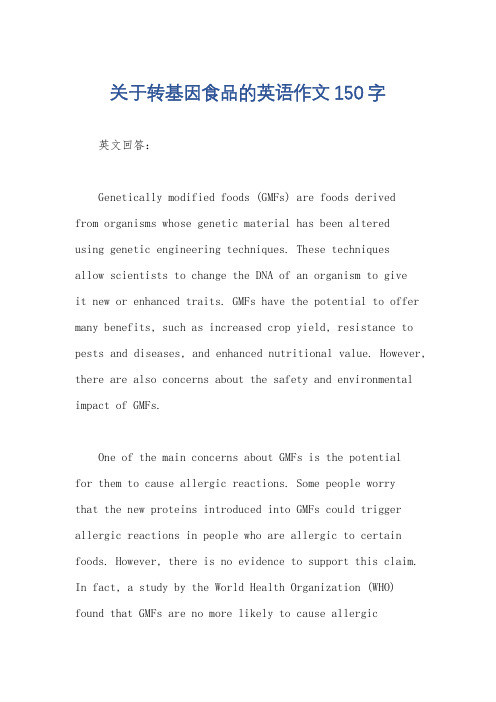
关于转基因食品的英语作文150字英文回答:Genetically modified foods (GMFs) are foods derivedfrom organisms whose genetic material has been alteredusing genetic engineering techniques. These techniquesallow scientists to change the DNA of an organism to giveit new or enhanced traits. GMFs have the potential to offer many benefits, such as increased crop yield, resistance to pests and diseases, and enhanced nutritional value. However, there are also concerns about the safety and environmental impact of GMFs.One of the main concerns about GMFs is the potentialfor them to cause allergic reactions. Some people worrythat the new proteins introduced into GMFs could trigger allergic reactions in people who are allergic to certain foods. However, there is no evidence to support this claim. In fact, a study by the World Health Organization (WHO) found that GMFs are no more likely to cause allergicreactions than conventional foods.Another concern about GMFs is the potential for them to harm the environment. Some people worry that GMFs could escape into the environment and cross-pollinate with wild plants, creating new superweeds that are resistant to herbicides. However, there is no evidence to support this claim. In fact, a study by the National Academy of Sciences found that GMFs are not more likely to escape into the environment than conventional crops.Overall, the evidence suggests that GMFs are safe for human consumption and the environment. However, more research is needed to address the concerns that people have about them.中文回答:转基因食品是指利用基因工程技术改变了其遗传物质的生物所产生的食品。
转基因食品的利与弊 英语作文

转基因食品的利与弊英语作文英文回答:As for the pros of genetically modified (GM) foods, there are a few points to consider. First of all, GM foods can help to increase crop yields, which is essential for feeding the growing global population. For example, scientists have developed GM crops that are resistant to pests and diseases, allowing farmers to produce more food on the same amount of land. This can help to reduce food shortages and improve food security in many parts of the world.Another advantage of GM foods is that they can be engineered to have a longer shelf life, which can reduce food waste. For instance, GM tomatoes have been modified to ripen more slowly, leading to less spoilage and longer storage times. This can be particularly beneficial in developing countries where access to refrigeration and proper storage facilities is limited.Furthermore, GM foods have the potential to be more nutritious and healthier. Scientists have been able to enhance the nutritional content of certain crops, such as adding more vitamins and minerals to rice. This can be especially beneficial for populations that suffer from malnutrition and dietary deficiencies.On the other hand, there are also some drawbacks to consider when it comes to GM foods. One of the main concerns is the potential for unintended harm to the environment and human health. For example, there is a fear that GM crops could crossbreed with wild plants, leading to the spread of modified genes into natural ecosystems. Additionally, there are worries about the long-term effects of consuming GM foods, as the full impact on human healthis not yet fully understood.Another drawback is the potential for corporate control over the food supply. Many GM seeds are patented by biotechnology companies, which can lead to a monopoly on the market and limited options for farmers. This can havenegative implications for small-scale farmers who may become dependent on a single company for their seeds and agricultural inputs.In conclusion, GM foods have the potential to address some of the world's food security and nutrition challenges, but they also come with potential risks to the environment and human health, as well as concerns about corporate control. It is important to carefully weigh the pros and cons of GM foods and consider the ethical, social, and environmental implications before fully embracing this technology.中文回答:说到转基因食品的利与弊,有一些要考虑的观点。
有机食品与传统食品区别的英语作文
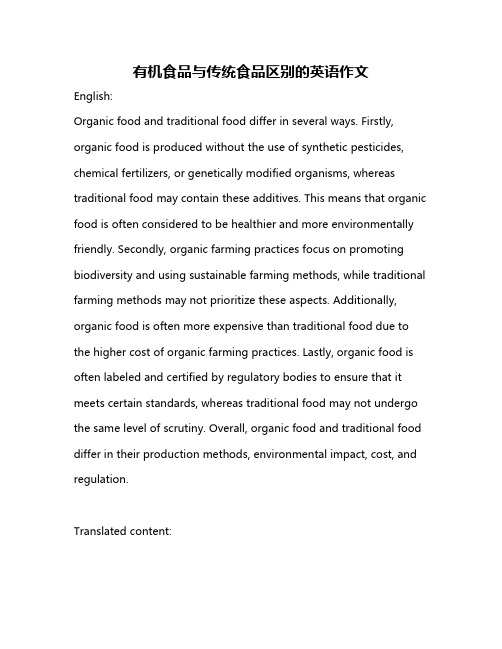
有机食品与传统食品区别的英语作文English:Organic food and traditional food differ in several ways. Firstly, organic food is produced without the use of synthetic pesticides, chemical fertilizers, or genetically modified organisms, whereas traditional food may contain these additives. This means that organic food is often considered to be healthier and more environmentally friendly. Secondly, organic farming practices focus on promoting biodiversity and using sustainable farming methods, while traditional farming methods may not prioritize these aspects. Additionally, organic food is often more expensive than traditional food due to the higher cost of organic farming practices. Lastly, organic food is often labeled and certified by regulatory bodies to ensure that it meets certain standards, whereas traditional food may not undergo the same level of scrutiny. Overall, organic food and traditional food differ in their production methods, environmental impact, cost, and regulation.Translated content:有机食品和传统食品在几个方面存在差异。
(英文PPT)对转基因食品与有机食品的观点
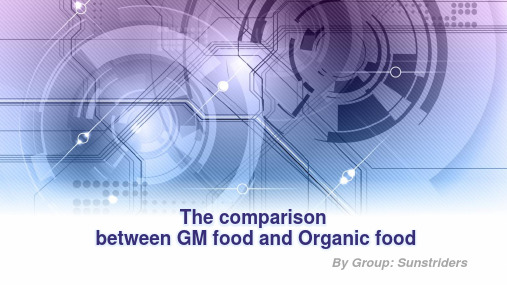
Contrast
Increase crop yield and reduce cost
Less pests and virus for crops
Nonuse of genetic technology
Ban food additives
Unknown effects on human health
The comparison between GM food and Organic food
By Group: Sunstriders
Content
Definitions of GM food and organic food
Comparisons
Attitudes and viewpoints
Abundance of nutrient materials
Eco-friendly
International attitudes
Western countries African countries
European countries
Asian countries
Viewpoints
For genetically modified food • As far as I’m concerned, genetically modified food can indeed meet some needs that people want, but meanwhile, the GM food security should be paid more attention to because of the risk of unclear effects. For organic food • To our knowledge, the organic food is worth practical production. And we are more likely to choose it if organic food can be more productive and beneficial to our bodies. Organic food still needs promotion and improvements.
转基因食品看法英文作文

转基因食品看法英文作文英文:Transgenic foods, commonly referred to as genetically modified organisms (GMOs), have sparked intense debates globally. These discussions often revolve around their safety, ethical implications, and impact on the environment and economy. My view on transgenic foods is nuanced, considering both the potential benefits and concerns associated with their widespread use.On one hand, transgenic foods have the potential to address various agricultural challenges. For instance, genetically modified crops can be engineered to resistpests and diseases, reducing the need for harmful pesticides. This not only improves crop yields but also minimizes the environmental damage caused by conventional farming practices. In regions with food scarcity,genetically modified crops engineered for increased nutritional value could help combat malnutrition and hunger.Moreover, transgenic foods have the potential to enhance food security by increasing resilience to climate change. Through genetic modification, crops can be made more drought-tolerant or capable of thriving in poor soil conditions, ensuring stable yields even in adverse environmental conditions.However, despite these potential benefits, concerns regarding the safety of transgenic foods persist. Some argue that the long-term health effects of consuming genetically modified organisms are still uncertain. There are also worries about the potential for transgenes to spread to wild plant populations, leading to unintended ecological consequences.Additionally, the dominance of transgenic crops in agricultural systems could exacerbate issues of corporate control over seeds and agricultural practices. This raises questions about the socioeconomic impacts of widespread adoption of genetically modified crops, particularly for small-scale farmers who may become dependent on largebiotechnology corporations for seeds and agricultural inputs.In my view, the key lies in rigorous scientific research and transparent regulation to ensure the safety and responsible use of transgenic foods. While acknowledging the potential risks, I believe that genetically modified organisms can play a beneficial role in addressing global food security challenges if deployed responsibly.中文:转基因食品,通常被称为基因改造生物(GMO),在全球范围内引发了激烈的辩论。
- 1、下载文档前请自行甄别文档内容的完整性,平台不提供额外的编辑、内容补充、找答案等附加服务。
- 2、"仅部分预览"的文档,不可在线预览部分如存在完整性等问题,可反馈申请退款(可完整预览的文档不适用该条件!)。
- 3、如文档侵犯您的权益,请联系客服反馈,我们会尽快为您处理(人工客服工作时间:9:00-18:30)。
African countries
European countries
Asian countries
Viewpoints
For genetically modified food
• As far as I’m concerned, enetically modified food can indeed meet some needs that people want, but meanwhile, the GM food security should be paid more attention to because of the risk of unclear effects.
The comparison between GM food and Organic food
By Group: Sunstriders
Content
Definitions of GM food and organic food Comparisons
Attitudes and viewpoints
THANKYOU
Genetically Modified Food
Genetically modified (GM) food is processed by genetically modified organisms, which transfer one or several exogenous (外源 性) genes into certain living organism through genetic engineering technology to make it express the corresponding products (peptide or protein).
For organic food
• To our knowledge, the organic food is worth practical production. And we are more likely to choose it if organic food can be more productive and beneficial to our bodies. Organic food still needs promotion and improvements.
Organic Food
Organic food internationally refers to naturally non-polluted foods. Organic food was produced usually from organically agricultural systems.
Unknown effects on human health
Nonuse of genetic
technology
Ban food additives
Abundance of nutrient materials
Eco-friendly
International attitudes
Western countries
Organic food is processed according to professional principles and processing standards.
Contrast
Increase crop yield and
reduce cost
Less pests and virus for crops
